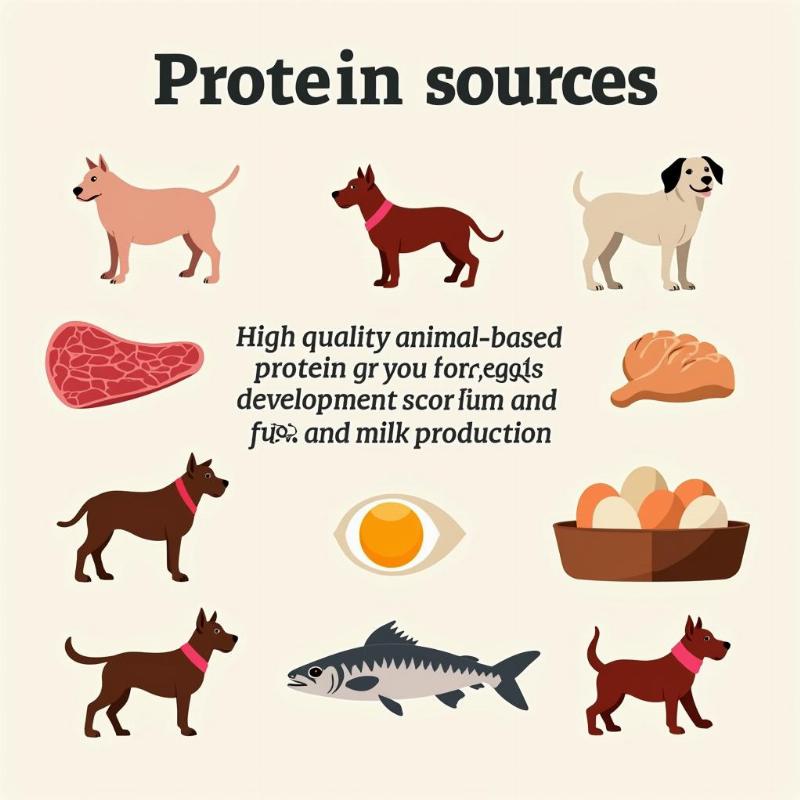Choosing the best dog food for breeding dogs is crucial for the health of both the mother and her puppies. Proper nutrition during pregnancy and lactation supports healthy fetal development, successful whelping, and abundant milk production. This article will guide you through selecting the right dog food for your breeding dog, considering factors like life stage, breed size, and activity level. We’ll delve into the essential nutrients, common ingredients, and reputable brands to ensure your breeding dog receives the optimal diet for a successful breeding program.
Understanding the Nutritional Needs of Breeding Dogs
Breeding dogs have significantly higher nutritional requirements compared to their non-breeding counterparts. Their diet must support the growth and development of puppies in utero and, later, provide the energy and nutrients necessary for milk production. These increased demands necessitate a diet rich in protein, fat, and essential vitamins and minerals. Think of it like fueling a high-performance engine – your breeding dog needs premium fuel to perform at her best. What are those key nutrients?
Protein Powerhouse
Protein is the building block of life, essential for muscle development, tissue repair, and the production of enzymes and hormones. Breeding dogs need a diet with higher protein content, typically around 29-32%, to support fetal growth and milk production. Look for high-quality animal-based protein sources like chicken, beef, lamb, and fish.
 Best Protein Sources for Breeding Dogs
Best Protein Sources for Breeding Dogs
Essential Fatty Acids
Fatty acids like omega-3 and omega-6 are vital for brain development, healthy skin and coat, and immune function in both the mother and puppies. A diet rich in these essential fatty acids, derived from sources like fish oil and flaxseed, can significantly benefit the overall health and well-being of your breeding dog and her litter.
Vitamins and Minerals
A balanced blend of vitamins and minerals is essential for supporting various bodily functions, including bone development, immune system health, and reproductive efficiency. Calcium, phosphorus, and vitamin D are particularly important for skeletal growth in puppies. Ensure the chosen dog food provides a complete and balanced vitamin and mineral profile.
Choosing the Right Dog Food
With so many dog food options available, selecting the best one for your breeding dog can feel overwhelming. Here’s a breakdown of key factors to consider:
Life Stage Formulation
Opt for dog food specifically formulated for “growth and reproduction” or “all life stages,” as these formulas meet the higher nutritional demands of breeding dogs. These specialized diets are designed to provide the optimal balance of nutrients for pregnancy, lactation, and puppy development.
Breed Size Considerations
Large breed dogs have different nutritional needs compared to smaller breeds. Large breed formulas often contain controlled levels of calcium and phosphorus to support healthy bone growth and prevent skeletal issues in puppies.
Activity Level
A highly active breeding dog will require more calories than a less active one. Consider your dog’s activity level when choosing a dog food to ensure she receives adequate energy to support her needs and those of her puppies.
Ingredient Quality
Prioritize dog foods with high-quality ingredients, focusing on animal-based protein sources listed as the first few ingredients. Avoid fillers like corn, wheat, and soy, which can be difficult to digest and offer limited nutritional value.
Reputable Dog Food Brands
Several reputable brands offer high-quality dog food suitable for breeding dogs. Researching and comparing different brands can help you find the best fit for your dog’s specific needs and preferences. Look for brands that conduct feeding trials and adhere to AAFCO (Association of American Feed Control Officials) guidelines.
spanish water dog puppies for sale
Common Questions about Feeding Breeding Dogs
1. When should I switch my dog to breeding dog food? Ideally, switch your dog to a breeding formula a few weeks before planned breeding to allow her body to adjust to the new diet.
2. How much should I feed my pregnant dog? Gradually increase food intake as pregnancy progresses, typically by 25-50% by the end of gestation. Consult your veterinarian for specific feeding recommendations based on your dog’s breed and condition.
3. Can I supplement my breeding dog’s diet? While a complete and balanced dog food should provide all necessary nutrients, consult with your veterinarian before adding any supplements to ensure they are safe and beneficial.
4. What are signs of nutritional deficiency in a breeding dog? Signs might include weight loss, poor coat condition, lethargy, and decreased milk production. Consult your veterinarian if you notice any of these symptoms.
5. How do I transition my breeding dog back to regular dog food after weaning? Gradually decrease the amount of breeding dog food and increase the amount of her regular adult maintenance food over a period of one to two weeks.
hypoallergenic dogs puppies for sale
Conclusion
Providing the best dog food for your breeding dog is an investment in the health and well-being of both the mother and her puppies. By understanding the nutritional requirements of breeding dogs and choosing a high-quality, appropriately formulated diet, you can ensure a successful and healthy breeding program. Remember to consult with your veterinarian for personalized guidance based on your dog’s individual needs.
Beautdogs.us is your one-stop resource for expert advice on dog breeds, care, and products. We offer comprehensive guides for both new and experienced dog owners, helping you navigate the exciting world of canine companionship. For personalized advice or inquiries, reach out to our team of experts at [email protected] or call us at +1 501-555-7529. Beautdogs.us – Your trusted partner in all things dog!